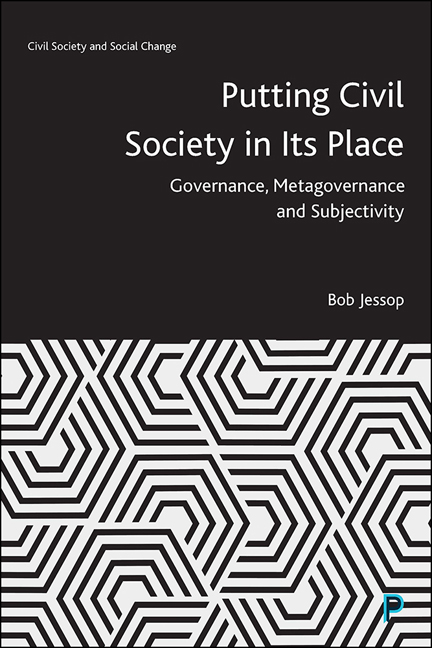Book contents
- Frontmatter
- Dedication
- Contents
- List of Tables and Figures
- Abbreviations
- Note on the Author
- Acknowledgements
- Licensing Information
- Preface
- 1 Introduction
- Part I Complexity, Contingency and Governance
- Part II Locating Civil Society as a Mode of Governance
- Part III Governance Failure and Metagovernance
- Endnotes
- References
- Index
2 - The Governance of Complexity and the Complexity of Governance
Published online by Cambridge University Press: 18 March 2021
- Frontmatter
- Dedication
- Contents
- List of Tables and Figures
- Abbreviations
- Note on the Author
- Acknowledgements
- Licensing Information
- Preface
- 1 Introduction
- Part I Complexity, Contingency and Governance
- Part II Locating Civil Society as a Mode of Governance
- Part III Governance Failure and Metagovernance
- Endnotes
- References
- Index
Summary
The natural and social worlds (and their interconnections) are far too complex to be understood in all their complexity or effectively governed in all their complexity in real time. This pair of statements is too simple: complexity is complex. This is reflected in the tendency for complexity to become a chaotic concept – especially in the social sciences, where mathematical formalization is difficult and metaphorical expression is common. It follows that we must first reduce the complexity of complexity in order to connect it to problems of governance and metagovernance. Indeed, faced with complexity, simplification is essential for any operating system or agent to be able to ‘go on’ in the world. Ontological complexity enforces selection on natural and social systems alike. One way to study such systems is in terms of how they select selections. In the social world, complexity is reduced in two main ways. The first is simplification through semiosis (sense-or meaning-making), which is associated with specific systems of meaning and forms of representation and tied to personal and collective identities. The second is simplification through various modes of structuration, which set limits to action repertoires and compossible sets of social relations in time-space, and through attempts to articulate (collibrate) different forms of structuration. Governance is relevant in both respects: its success depends on the adequacy of social imaginaries to the complexities of the real world and on the adequacy of the modes of governance to the objects that are to be governed.
Given these remarks, this chapter addresses the recent discovery of ‘governance’ as the complex art of steering multiple agencies, institutions and systems that are both operationally autonomous from one another and structurally coupled through various forms of reciprocal interdependence. This discovery could reflect the dramatic intensification of societal complexity that flows from growing functional differentiation of institutional orders within an increasingly global society with all that this implies for the widening and deepening of systemic interdependencies across various social, spatial and temporal horizons of action.
- Type
- Chapter
- Information
- Putting Civil Society in Its PlaceGovernance, Metagovernance and Subjectivity, pp. 35 - 64Publisher: Bristol University PressPrint publication year: 2020



